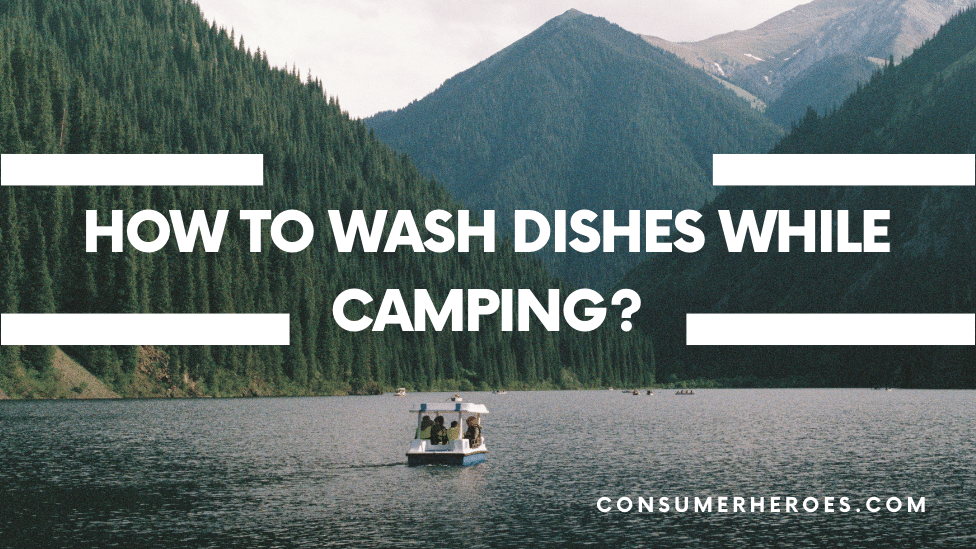Washing dishes while camping can be a daunting task if you’re not prepared. It’s important to keep your campsite clean and free of debris to avoid attracting animals and insects. However, with a little planning and the right tools, washing dishes while camping can be a breeze.
First, it’s important to bring the right supplies. A collapsible basin, biodegradable soap, and a scrub brush are essential for washing dishes while camping. It’s also important to bring a separate container for clean water to rinse off your dishes.
When it’s time to wash dishes, start by scraping off any excess food into a garbage bag or compost bin. Then, fill up your collapsible basin with hot water and add a small amount of biodegradable soap. Scrub your dishes with a scrub brush, making sure to get all the nooks and crannies. Rinse your dishes in the clean water container and let them air dry. By following these simple steps, you can keep your campsite clean and free of debris while enjoying your time in nature.
Choosing the Right Camping Dishes
When it comes to camping, choosing the right dishes can make a big difference in how easy and enjoyable mealtime is. Here are a few things to consider when selecting dishes for your camping trip:
Material
The material of the dish can affect how easy it is to clean, how durable it is, and how heavy it is to carry. Here are some common materials to consider:
- Plastic: Lightweight and durable, but can scratch easily and may not be as heat-resistant as other materials.
- Melamine: Similar to plastic, but more heat-resistant and less prone to scratching.
- Enamel: Durable and heat-resistant, but heavier than plastic or melamine.
- Stainless steel: Very durable and heat-resistant, but heavy and may not be ideal for backpacking.
Size and Shape
Consider the size and shape of the dishes you choose. Will they fit easily in your storage containers or backpack? Will they stack well to save space? Will they be large enough to hold your meals?
Special Features
Some dishes come with special features that can make them more convenient for camping, such as:
- Collapsible: These dishes can be flattened for easy storage and transportation.
- Nesting: Dishes that nest together can save space in your storage containers or backpack.
- Multi-Use: Some dishes can double as pots or pans, which can save space and weight in your pack.
Overall, when selecting camping dishes, it’s important to consider the material, size and shape, and any special features that may make mealtime easier and more enjoyable.
Understanding the Importance of Clean Dishes
When camping, it is essential to keep a clean campsite to prevent the spread of germs and avoid attracting wildlife. One of the most important aspects of maintaining a clean campsite is washing dishes properly. Dirty dishes can attract insects and animals, and can also lead to the spread of illness among campers.
Washing dishes while camping may seem like a daunting task, but it is an essential part of the camping experience. Clean dishes not only help to keep the campsite clean and sanitary, but they also ensure that campers have access to clean, hygienic utensils and cookware.
When washing dishes while camping, it is important to use biodegradable soap and to dispose of wastewater properly. Campers should also avoid washing dishes in natural water sources, such as lakes or rivers, as this can lead to contamination of the water and harm local wildlife.
Overall, understanding the importance of clean dishes while camping is crucial for maintaining a safe and healthy campsite. By following proper dishwashing techniques and disposing of wastewater responsibly, campers can help to protect the environment and ensure a safe and enjoyable camping experience for everyone.
Gathering Necessary Cleaning Supplies
When camping, it’s important to have the necessary cleaning supplies to wash dishes properly. Here are some essential items to gather before starting:
- Dish soap: Choose a biodegradable soap to minimize the impact on the environment.
- Scrubber or sponge: A scrubber or sponge is needed to remove food particles and grease from dishes.
- Dishcloth or towel: A dishcloth or towel is useful for drying dishes after washing.
- Bucket or basin: A bucket or basin is necessary to hold water for washing dishes.
- Water container: A water container is needed to transport water from a water source to the campsite.
It’s important to note that some campsites may have specific rules regarding dishwashing, such as requiring the use of a designated dishwashing area or prohibiting the use of soap in natural water sources. Be sure to check the rules and regulations of the campsite before starting to wash dishes.
Once all the necessary supplies have been gathered, it’s time to start washing dishes.
Choosing the Right Cleaning Method
When it comes to washing dishes while camping, there are a few different methods you can use. Choosing the right method will depend on your specific situation and personal preference. Here are three common cleaning methods to consider:
River or Lake Cleaning
If you’re camping near a river or lake, you can use the natural water source to clean your dishes. To do this, you’ll need a basin or bucket to hold your dirty dishes, as well as biodegradable soap.
Here’s how to wash your dishes in a river or lake:
- Fill your basin or bucket with water from the river or lake.
- Add a small amount of biodegradable soap to the water.
- Scrub your dishes with a sponge or scrub brush, making sure to remove all food particles and grease.
- Rinse your dishes in the river or lake.
- Let your dishes air dry.
Portable Sink Cleaning
If you prefer a more controlled cleaning environment, you can bring a portable sink with you on your camping trip. Portable sinks are easy to set up and can be used with or without running water.
Here’s how to wash your dishes in a portable sink:
- Fill your sink with hot water and a small amount of biodegradable soap.
- Scrub your dishes with a sponge or scrub brush, making sure to remove all food particles and grease.
- Rinse your dishes in a separate basin or with a spray bottle of clean water.
- Let your dishes air dry.
No-Water Cleaning
If you’re camping in an area where water is scarce or you simply don’t want to use water to clean your dishes, there are a few no-water cleaning methods you can try.
Here are a few options:
- Use a dry cloth or paper towel to wipe down your dishes.
- Use a small amount of sand or dirt to scrub your dishes clean.
- Use a spray bottle filled with vinegar or rubbing alcohol to sanitize your dishes.
No matter which cleaning method you choose, make sure to dispose of any dirty water or soap properly. Follow Leave No Trace principles and avoid contaminating natural water sources.
Step-by-Step Dish Washing Process
When camping, washing dishes can be a daunting task without the convenience of a dishwasher or sink. However, with the right tools and techniques, it can be a quick and easy process. Follow these simple steps to wash dishes while camping.
Pre-Cleaning
Before starting the actual dishwashing process, it is important to pre-clean the dishes. This involves scraping off any excess food particles and disposing of them properly. This step helps to prevent clogging of the drain or sink.
Scrubbing
Next, it’s time to scrub the dishes. This can be done using a sponge or dishcloth and biodegradable soap. It’s important to use a soap that is safe for the environment to avoid polluting the campsite. Scrub the dishes thoroughly, paying extra attention to any areas with stubborn food residue.
Rinsing
After scrubbing, it’s time to rinse the dishes. This can be done using a basin of clean water or a portable camping shower. Make sure to rinse the dishes thoroughly to remove any soap residue. It’s important to conserve water while camping, so try to use as little water as possible during this step.
Drying
Finally, it’s time to dry the dishes. This can be done using a clean towel or by air-drying. If using a towel, make sure it’s clean to avoid any contamination. Air-drying is a great option to conserve water, but it may take longer for the dishes to dry completely.
By following these simple steps, washing dishes while camping can be a breeze. Remember to use biodegradable soap and conserve water to keep the campsite clean and safe for everyone.
Proper Disposal of Wastewater
When washing dishes while camping, it’s important to properly dispose of wastewater to minimize environmental impact. Here are some tips for disposing of wastewater:
- Strain food particles: Before washing dishes, use a strainer to remove any food particles from the wastewater. This will make it easier to dispose of the wastewater and prevent clogs in your drainage system.
- Use biodegradable soap: When washing dishes, use biodegradable soap to minimize the impact on the environment. Avoid using regular dish soap, as it can harm plants and animals in the area.
- Dispose of wastewater away from water sources: Wastewater should be disposed of at least 200 feet away from any water sources, such as lakes, streams, or rivers. This will prevent contamination of the water and protect aquatic life.
- Bury the wastewater: After straining out food particles and using biodegradable soap, bury the wastewater in a hole that is at least 6 to 8 inches deep. Cover the hole with dirt to prevent animals from digging it up.
- Pack out wastewater: In areas where burying wastewater is not allowed or not practical, pack it out in a sealed container and dispose of it properly in a designated waste receptacle.
By following these tips, campers can wash their dishes while minimizing their impact on the environment.
Maintaining Cleanliness Throughout the Trip
Maintaining cleanliness while camping is crucial to ensure a comfortable and safe trip. Here are some tips to help campers maintain cleanliness throughout their camping trip:
- Use biodegradable soap: When washing dishes, it is important to use biodegradable soap to avoid contaminating the environment. Biodegradable soap is specially formulated to break down quickly and not harm the environment.
- Wash dishes after each meal: Washing dishes after each meal is a good way to ensure that they do not pile up and become difficult to clean. It also helps to keep the campsite clean and free from pests.
- Use a separate basin for washing dishes: Using a separate basin for washing dishes helps to prevent contamination and makes it easier to dispose of wastewater. It is important to dispose of wastewater properly and not dump it in the environment.
- Use a dish rack: Using a dish rack helps to keep dishes organized and allows them to dry faster. It also helps to prevent contamination by keeping dishes off the ground.
- Wash hands frequently: Washing hands frequently is important to prevent the spread of germs and bacteria. Campers should use soap and water or hand sanitizer to clean their hands before and after handling food, using the bathroom, or touching anything that may be contaminated.
By following these tips, campers can maintain cleanliness throughout their camping trip and ensure a safe and enjoyable experience.
Conclusion
Washing dishes while camping can be a daunting task, but with the right tools and techniques, it can be a breeze. By following the steps outlined in this article, campers can ensure that their dishes are clean and ready to use for the next meal.
One important thing to keep in mind is to always properly dispose of any food waste before washing dishes. This will prevent clogging the drain or attracting wildlife to the campsite.
Using biodegradable soap and hot water is ideal for cleaning dishes while camping. It is also important to rinse dishes thoroughly to remove any soap residue.
Investing in a collapsible basin and drying rack can make the dishwashing process much easier and more efficient. It is also helpful to have a scrub brush or sponge specifically designated for cleaning dishes.
Overall, with the right preparation and tools, washing dishes while camping can be a simple and hassle-free task.







